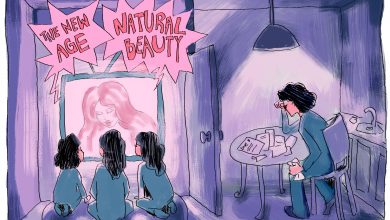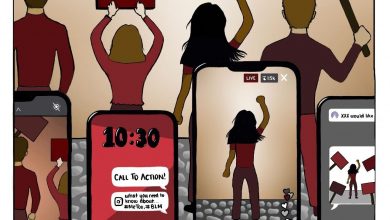The Use of the Word “Fag”: A Tool of Shame
The other day, an experience at my school dining hall made me slightly sick to my stomach, and it wasn’t because of the food. It was because of a conversation I overheard that went something along the lines of:
“There are gay guys who are aren’t fags at all and guys who aren’t gay but act like total fags.”
The statement bothered me because this guy felt he had the right to describe people using an insensitive slur. It also had me confused; if the word fag doesn’t apply to homosexuality, what does it apply to? Just because the definition has shifted, does it make it okay to use?
Louis C.K. is funny. I know that sounds totally unrelated, but stay with me. Louis is a great comedian, but he has a bit of stand up involving use of the word “faggot” that I do not love so much.
He specifically says, “I would never call a gay guy a faggot, unless he was being a faggot, but not because he’s gay. You know what I’m saying.”
I wasn’t sure what he was saying, so I heard him out. He goes on to explain the only reason he would apply “fag” to gay men: “If one of them…started acting all faggy and saying annoying faggy things, You know, ‘People from Phoenix are Phonecians’ or something like that, I’d be like, ‘Hey, shut up, faggot.’”
So, according to Louis. C.K, “faggot” is defined not by homosexuality, but by a characteristic of being irritating.
Maybe the dining hall guy shared this sentiment. I know Louis was trying to make a point that his use of the word isn’t homophobic, but I was still unsettled by it.
Okay, so a word has a different meaning for you than it does for other people, sure. But does this make it right for you to say it? The problem is that words like “fag” have been used negatively for years. “Faggot,” although historically defined as “a bundle of sticks,” turned into the shortened word “fag” when it appeared in America as a slang term for homosexual men in the early 20th century. It was used around the same time in England to insult women who were considered irritating.
Words with such a derogatory history are still hurtful and offensive today.
You may be using it in good humor or with a close friend, but that doesn’t mean what you’re saying won’t be hurtful to someone else. The individual doesn’t get to decide what is offensive, especially if they are not part of the group that is being insulted.
Maybe it’s a case of reclaiming the word. People seem to assume that if we use “fag” as a term that doesn’t apply to homosexuality, maybe it will lose its offense. However, it seems to me that we’re not reclaiming it as something positive, because we’re still using it as an insult and term of shame.
We have redefined the word to not often explicitly apply to homosexuality, but rather to characteristics and actions that are failures of masculinity. In the book Dude, You’re a Fag, C.J. Pascoe writes about the way the word is used among high school students in relation to masculinity and sexuality.
According to the students Pascoe interviews, the word “fag” only applies to guys and is used for almost anything: “Like you were trying to turn a wrench the wrong way, ‘Dude, you’re a fag.’ Even if a piece of meat drops out of your sandwich, ‘You fag!’”
Apparently these are actions that characterize failure of what we have defined as masculine.
Pascoe observes the guidelines for the word’s use among teenagers:
“Becoming a fag has as much to do with failing at the masculine tasks of competence, heterosexual prowess, and strength or in any way revealing weakness or femininity as it does with sexual identity.”
This can be seen again when popular female rap artist Azealia Banks, posted a twitter status clarifying her definition of the word:
“A faggot is not a homosexual male. A faggot is any male who acts like a female. there’s a BIG difference.”
Hold up. So, being homosexual isn’t the problem, but male-femininity regardless of sexual orientation is? By this logic, we are using femininity as a way to insult and shame men. This seems to mean that if you act irritating, weak or incompetent, you are acting like a girl, and vice versa.
Not only is this degrading to women by implying that femininity is equal to failure and masculinity is equal to success, it’s oppressive to men because it creates a concept of masculinity that they have to achieve, or else they will be shamed.
This doesn’t seem to solve the problem at all.
The guy at the dining hall is probably not reading this. But if he is, I would just like to remind him to think before he decides to redefine words and use them however he wants. I would ask him to consider that his words can have an effect, whether it’s towards people who have suffered from the insult because of their sexual orientation, towards females whose characteristics are equated with failure, or towards males who are being shamed into a tight construct of masculinity.
Whatever the case, it is important to keep in mind that words carry powerful meanings and we should be aware of how we use them.





As another author recently pointed out, “faggot” is still a slur many gay persons hear just before someone smashes their face into concrete.
There is a self-loathing element of the gay community which seeks to aggressively reclaim the word with an outrageous attitude. But reclaimation isn’t that simple. Some people trying to use the word with an insistent new context are just empowering its negative uses, as the word is so heavily loaded with heteronormative censorship. Even when some gay men use it, they almost can’t help but invoke the word in a form of self-punishment: mocking themselves for being too feminine.
I tend to agree with the perspective that language reclaimation should not be focused on a replacement form of cultural supremacy (trading one oppressive application of a problematic word for another). It should be used to gradually leech a word of its harmful power, but that process does not necessarily involve insisting that those who find the word painful are misguided and should stop feeling that way about it. Many slur words are just plain ugly words – even when neutralized they’re still awkward and unhelpful to re-purpose. Sometimes reclaimation is about letting a word die because it becomes pointless – not a cartoonish game of Opposite Day, where every bad word becomes good.